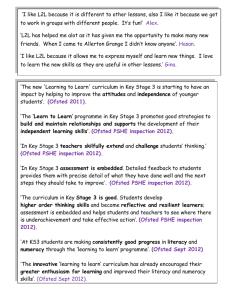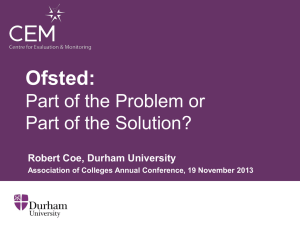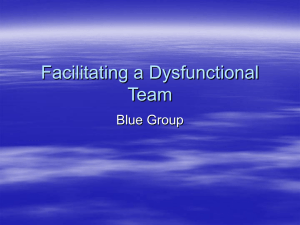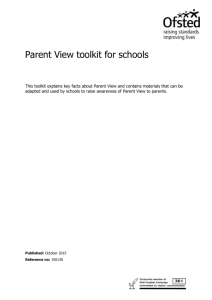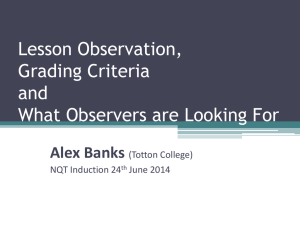This is a story about heads who end up losing their self
advertisement
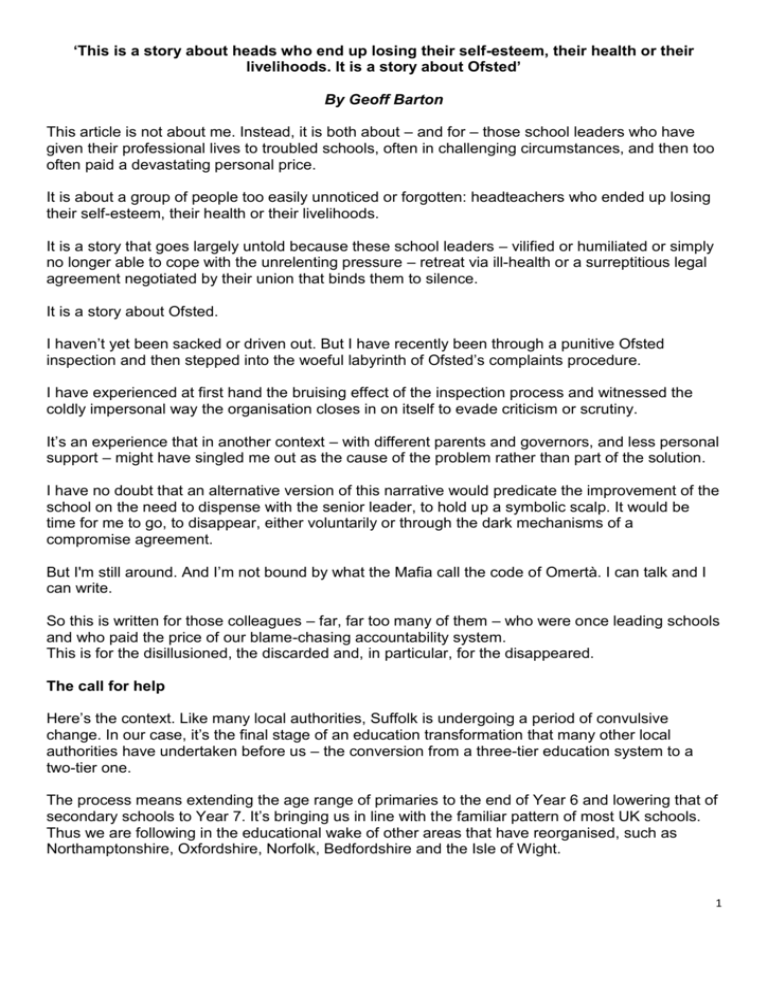
‘This is a story about heads who end up losing their self-esteem, their health or their livelihoods. It is a story about Ofsted’ By Geoff Barton This article is not about me. Instead, it is both about – and for – those school leaders who have given their professional lives to troubled schools, often in challenging circumstances, and then too often paid a devastating personal price. It is about a group of people too easily unnoticed or forgotten: headteachers who ended up losing their self-esteem, their health or their livelihoods. It is a story that goes largely untold because these school leaders – vilified or humiliated or simply no longer able to cope with the unrelenting pressure – retreat via ill-health or a surreptitious legal agreement negotiated by their union that binds them to silence. It is a story about Ofsted. I haven’t yet been sacked or driven out. But I have recently been through a punitive Ofsted inspection and then stepped into the woeful labyrinth of Ofsted’s complaints procedure. I have experienced at first hand the bruising effect of the inspection process and witnessed the coldly impersonal way the organisation closes in on itself to evade criticism or scrutiny. It’s an experience that in another context – with different parents and governors, and less personal support – might have singled me out as the cause of the problem rather than part of the solution. I have no doubt that an alternative version of this narrative would predicate the improvement of the school on the need to dispense with the senior leader, to hold up a symbolic scalp. It would be time for me to go, to disappear, either voluntarily or through the dark mechanisms of a compromise agreement. But I'm still around. And I’m not bound by what the Mafia call the code of Omertà. I can talk and I can write. So this is written for those colleagues – far, far too many of them – who were once leading schools and who paid the price of our blame-chasing accountability system. This is for the disillusioned, the discarded and, in particular, for the disappeared. The call for help Here’s the context. Like many local authorities, Suffolk is undergoing a period of convulsive change. In our case, it’s the final stage of an education transformation that many other local authorities have undertaken before us – the conversion from a three-tier education system to a two-tier one. The process means extending the age range of primaries to the end of Year 6 and lowering that of secondary schools to Year 7. It’s bringing us in line with the familiar pattern of most UK schools. Thus we are following in the educational wake of other areas that have reorganised, such as Northamptonshire, Oxfordshire, Norfolk, Bedfordshire and the Isle of Wight. 1 Conscious of its significant underperformance at key stage 2 and key stage 4, Suffolk is doing what Suffolk needs to do, and a long-awaited change is in its final phase. In September 2016, almost all the county’s state schools will be fully two-tier. The process has been a bloody and controversial one. Parents are understandably familiar with a three-tier schooling system that has been around since the early 1970s, and which many feel sentimentally attached to. This is where our story begins. The headteacher of one of our town’s middle schools announced in the summer term of 2014 that she would be stepping down for personal reasons. The governors found that trying to recruit a new headteacher to a hybrid school with an 8-13 age range that would be closing in two years was problematic. There were two applicants. One withdrew. No appointment could be made. Parents began to be spooked. Their children were in a closing school without a headteacher and uncertain prospects. Some began to move their children into neighbouring schools, or to talk of doing so. So at this point the governors of Hardwick Middle School asked the governors of my school, King Edward VI, whether we might help. We had worked in an informal but purposeful collaboration for three years. Almost all of the middle school children traditionally progressed to our school. It was an understandable and logical request. The idea was that I would oversee the two schools and that one of our senior leaders would take over as head of school. It was a model of precisely the kind of system leadership we are told is valued by the Department of Education, the National College for Teaching and Leadership and Ofsted. The mission So in September 2014 King Edward VI School formalised its partnership with Hardwick Middle School. A talented and long-established assistant headteacher from King Edward VI became the day-to-day head of school. My role came with a gruesome label that still makes me cringe: “executive headteacher”. Chiefly I lurked in the shadowy margins of early mornings and late evenings, ready to give advice if needed and to work on any particularly trenchant issues. It was a coaching role and that I came to enjoy once I’d shaken off the guilt of not being visible and hands-on all the time. There was the satisfaction of passing on a few occasional insights from grizzled experience to someone navigating a new course for the school. Our simple mission was to make the place better than it had been previously and to do all we could to give children in their final 18 months of the school’s life the best educational experience we could muster. We began on 1 September 2014. Ofsted visited 13 weeks later. We knew that the school’s previous judgement of “good” would be difficult to maintain. KS2 results had been on a downward trajectory, exacerbated by some fairy intractable staffing issues in a core subject. 2 But we also knew that what we did in the school should not be driven by Ofsted. From the opening staff meeting in September, the O-word was banned. Nothing would be done on the grounds that it was “required by Ofsted”. This, we were clear, would be a school that would improve because its staff team were on a mission to make teaching and learning better and to do so genuinely rather than with their backs to the wall, cowering at the prospect of inspection. We knew that the accusation traditionally levelled against middle schools was that they allowed KS2 tests to dominate school life. The most experienced staff, the most targeted teaching, the fiercest intervention plans – all are directed at Year 6 in order to get the highest results possible. The criticism goes that Year 7 and, especially, Year 8 can then drift or become neglected. We were determined that this would not happen: that we would not run a school based on what Ofsted might or might not want, nor on the educational needs of one year group out of four. In late December 2014, I sat in on the headteacher appraisal process, led by governors. They asked two preliminary questions. “Is the teaching better now than it was in September 2014?” and “Are the children making more progress?” The answer to both questions was yes. We had evidence in the monitoring data, corroborated by four external local authority advisers to the school, plus a range of other external visitors who we relied on to make sure we were applying more rigorous standards to a school at risk of coasting. We had staunched any sense of that. Parents confirmed that there was new pace and purpose in the teaching, greater challenge for students and better early intervention when a student was falling behind. The inspection On 21 January this year, Ofsted came. In our documentation and opening presentation, we explained the distinctive context to the team of three inspectors: that the school was in the early stages of being “under new management” and that it was especially important in a middle school to look at the kind of high-quality internal data we could provide. We set out the case for the school to be judged on what it was actually like now, rather than six months previously. At first the inspection appeared to go well. We knew there was a risk of teachers playing too safe, of resorting to some of the mechanistic teaching formulas that previous Ofsted schedules provoked across the profession – such as that madcap obsession with demonstrating progress in 20 minutes. We just wanted staff to teach and then step back so that children of that age could show what children of that age exude – a natural and intoxicating enthusiasm for learning things. And although there were blips, lessons went well. We asked every teacher to keep a note of their feedback from inspectors. We collected this. It suggested that while there was some over-safe teaching, plus some of the routine mini-crises in confidence that inspections generate, all was generally sound. 3 This, at least, was our reading of the inspection team’s ongoing comments and the perception of the staff. Behaviour was characteristically impressive. The buzz around the school was harmonious and infectious. This, it seemed, was a school at ease with itself and invigorated with new dynamism. If the school was to be toppled from its previous “good” judgement, then it wasn’t evident – either in what we were picking up from our own antennae or from the remarks of the inspection team. This was the kind of school where most of us would be more than happy to send our own children. At every opportunity we hammered home – and worried that we were overstating – the distinctiveness of the middle school context. “We don’t fit a classic two-tier pattern,” we kept pointing out. “Progress has to be measured from where children are when they join us in Year 4 to where they finish at the end of Year 8. Please don’t just focus on Year 6 attainment data.” But that, essentially, is what happened – an obsessive focus on KS2 attainment, a lack of appreciation of the school’s distinctive context, a reluctance to engage in meaningful dialogue. We know from Mick Waters’ brilliant book Thinking Allowed on Schooling that there is usually a certain sense of macho pantomime about this. Waters describes how lead inspectors will try to undermine the confidence of the school’s leadership to see how they respond the next day. They’ll lob a lower grading at you and watch your reaction. Waters characterises inspection as being about the “relative assertiveness” of the headteacher and the inspector, “with the inspector holding the all-important data”. Too often, it’s a rather squalid little game, often led by people whose responsibility for actually running a school is long-expired. Thus on Day 2 at the team meeting, it became clear that this previously “good” school was going to be “put into a category”, as the Ofsted euphemism has it. Hardwick would be judged inadequate – but, we were told, inadequate with “serious weaknesses” rather requiring “special measures”. This distinction was presented to us as if it were a huge concession for which we should unfurl celebratory bunting or tug a grateful forelock. It was supposedly a tribute to the new leadership. But it didn’t feel like a tribute to us. Behaviour was deemed category 3 (“requires improvement”) even though inspectors acknowledged that the courtesy, conduct, attendance and complete lack of bullying throughout their visit were all impressive. Parents, we knew, would react with disbelief at this apparently contradictory judgement – impeccable student conduct apparently requiring improvement: it was the dark double-think of Ofsted’s “behaviour for learning” formula. This is where the reality of the inspection regime began to kick in. Behaviour couldn’t be better than grade 3 because the results last summer hadn’t been good enough. Behaviour in the school on those January days had to be seen through the prism of the previous summer’s results. Data therefore drove the judgement. Even though students’ conduct was deemed exemplary in the feedback, they apparently hadn’t demonstrated the “hunger for learning” that would have led to higher KS2 results. Some scruffy 4 work had been spotted in some books in one subject, and this was taken as a sign of a disappointing “attitude to learning”. This kind of superficial leap from a detail to a supporting judgement strikes me as particularly laughable. In my world – which I like to think is closer to the real world than Ofsted’s – presentation may be scruffy precisely because someone is engaged in learning: it may be that they are focusing on the subject matter and not on their handwriting. It was as if evidence of some kind had to be scrabbled around for in order to justify a judgement that fit the data. And so it continued. Thus a school that had been good was now the only inadequate school in town. While teaching, behaviour and leadership were deemed to require improvement, the “limiting judgement” of a grade 4 for “achievement” sealed its overall fate as inadequate. And it had happened on my 13-week watch. The numerical judgements were rooted so deeply in historic KS2 attainment data – in a school structure that doesn’t fit traditional accountability points – that, quite frankly, the inspection team might as well have stayed at home, squinted at their flickering spreadsheets and phoned in their judgement. They could have saved Ofsted the travel expenses. “What could we have done in 13 weeks to get a different judgement?” we asked the lead inspector. “Nothing,” he replied. Data had won the day. At the end of the inspection, the team retreated to the car park leaving a group of us – governors, a local authority adviser, a new and a long-established headteacher – to reflect on quite how and why we had got to where we were. What possible incentive could there be for agreeing to help a school in difficulties if so little account was taken of what the new leadership had brought to bear? The complaint We decided to make a complaint, even though everyone advised us that this would be a waste of time and effort. But we had to complain. The judgement on the school was an injustice and we owed it to the students, the parents and the governors to state our case. Even though the published report contained many positive comments about the work of staff and the leadership team since September, this was not an inadequate school. Many parents, we knew, would not get far beyond the numbers – especially that punitive verdict on behaviour not being “good”. So we resorted to Ofsted’s complaints procedure. This would be hilarious if it wasn’t so Orwellian, predicated as it is on doing all it can to deter anyone from complaining. Such a mechanism then allows the organisation to claim that the rate of satisfaction with Ofsted is high. 5 Even getting the name of a specific person to address my complaint to proved impossible. In the end I had to resort to a bland “To whom it may concern”. The system appears to be built on a barbed-wire principle of deterrence. The first simplistic sign of this approach is to inform potential complainants that we must not question the inspectors’ judgements about category 4: “Ofsted won’t investigate complaints about the judgement of a report that says a school has a serious weakness or needs special measures. Judgements of this type are reviewed before being approved.” This, of course, is laughable. If our complaint is that inspectors have failed to look at the externally verified internal data we provided during the inspection, how exactly is a fact-checker in a far-flung office supposed to investigate that? They don’t have the data. Whose evidence are they going to be looking at? It’s a pre-emptive strike, of course, designed to confer a veneer of analytical rigour, but which essentially boils the process down to the inspector’s word against the complainant’s. I rejected the logic of this. I insisted to the subsequent HMI assigned to investigate our complaint that the original inspector’s notes should be released. This, I said, would quickly sort out the complaint one way or another. It would allow us to see what evidence those all-important final judgements were based on and whether due account had been given to the information we provided during the inspection. I was told that this request to see the evidence could definitely not be agreed to – and that I would have to resort to a Freedom of Information request. This response says a lot about an organisation so superficially precious about the quality of schools’ data and yet so determined not to reveal the processes that take place in its own back rooms. It seems extraordinary to me that the Ofsted refuses to release its inspectors’ evidence forms in order that we might see how a judgement was reached. Such a request would bring transparency and it would focus inspectors’ minds, knowing that the evidence they collected could be scrutinised, in the way that schools’ data is scrutinised constantly and publicly. This, after all, would have scotched my complaint if the inspection reports showed a catalogue of substandard teaching, marking and student progress. In response to the inspection report, we produced a forensically argued complaint. We spent, in total, more than 20 hours on it, knowing that this would likely be a futile use of our time. The document was much more systematic and dispassionate than this article. It focused on three core complaints, each supported with detailed evidence: 1. The inspection team failed to apply the framework for judging middle schools. 2. The inspection team has made an incorrect judgement about behaviour in the school. 3. The inspection team has failed to comply properly with the Ofsted Code of Conduct. And so it went on over 14 pages. 6 The unanswered questions I was telephoned by an investigating HMI, who took an avuncular “May I call you Geoff?” approach, and a similar phone conversation took place with our head of school. Both of us stood by our complaint. But we knew even before we began to restate our concerns that it was all a simple issue of one word against another. The final letter from the investigating HMI lists our evidence against the response of the lead inspector. In each case, it says: “This aspect of your complaint is not upheld.” It also contains that classic trope of so many bureaucrats, thanking me for raising my concerns and reassuring me that that “they have been noted”. I wrote back pointing out that this phase, in my experience, is a frequent tactic for obfuscation – “Your comments have been noted” too often means nothing. I asked for some clarification of what precisely had been noted, by whom, and for what purpose. I have heard nothing back, of course. Much of the above will feel like the whingeing of someone whose ego has been rightly dented or whose complacency required a public kicking. Perhaps. But I’m conscious also that there are wider implications here and that while I’m around to write publicly about a bruising but not catastrophic Ofsted process, too many colleagues disappear as a result of theirs. We are told that we have the best generation of school leaders. Why then are so many being so badly treated by an inspection system that belittles our professionalism and is resistant to constructive dialogue? One day someone will look back at this period and record the disgraceful rate of attrition of headteachers upon which our frenzied school system feeds. Good people, respected by their students and staff, and by their local communities, are in the corridors of their schools one day and next day they are gone. They are the disappeared. Me – I’m still here, and the fact that local parents are so dismissive of the Ofsted report reassures me that they also believe that the inspectorate has lost its integrity. Occasionally I get to speak to well-connected people far closer to government than I am. Their whispers are all about an organisation that has become a monster, which rather than helping us to improve our schools, feels insular, self-serving, spiteful and inconsistent. Many readers might wonder what purpose spending public money inspecting a school near the end of its life might serve. They might question why judgements should be so neurotically linked to historic data rather than to how students in the school are performing now. More fundamentally, they might ask what incentives there are for any of us to support struggling schools if inspection judgements will not reflect the impact we are trying to make. I know that some headteachers are undergoing Ofsted training, either because they want to look beneath the skin of a mystical process or because they actually want to inspect. 7 Me? I wouldn’t want to be complicit in an organisation that does such damage to the profession. I couldn’t be prouder to be working day by day in a real school, alongside young people and their parents, with fellow teachers and other staff. Our job in educational leadership is much harder, I suspect, than that of an Ofsted inspector. But we can look ourselves in the mirror each evening knowing that even if we got things wrong, even if things unravelled a bit, our basic mission remains an honourable one. We know that we are ultimately in our posts to support our young people, our colleagues and our communities. We are there, even on the most difficult of days, trying our best to make our schools better. Shouldn’t Ofsted be trying to do the same? Geoff Barton is headteacher of King Edward VI School and executive headteacher of Hardwick Middle School, Suffolk. This article first appeared on TES Connect on 27.04.15 at: https://www.tes.co.uk/news/schoolnews/breaking-views/%E2%80%98-a-story-about-heads-who-end-losing-their-self-esteem-theirhealth 8

